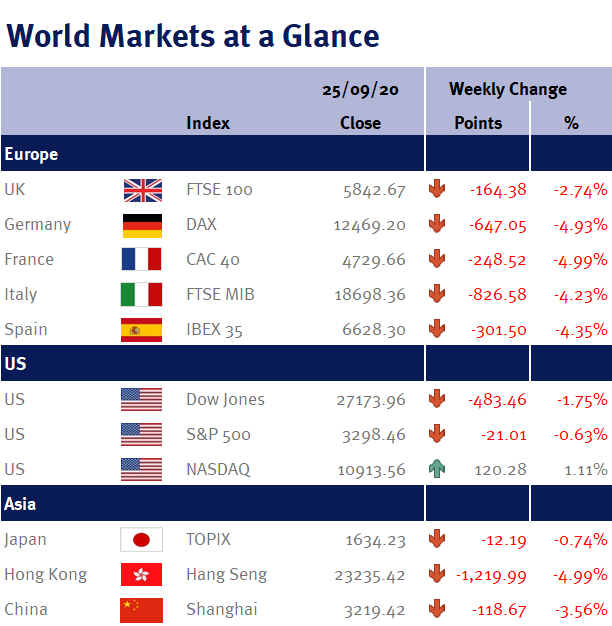All-in-all it’s been a positive week for equity markets despite all the negative news headlines.
As you can see from the accompanying table, the UK’s FTSE-100 ended the week just over 233 points higher. That is a gain of 4%. Helping this strong upward move was the weakening pound – given around two-thirds of the FTSE-100’s total revenue is derived from abroad, a weaker pound benefits exporters and those constituents with large overseas earnings.
The notable exception to this advance were the US equity markets. As we explained in our last update (please see here), it has been the heavy-weighted technology stocks, such as Apple, Alphabet and Amazon, that have pulled the US indices lower. However, we don’t believe there is anything sinister in this downward move: it is simply profit-taking, similar to wiping the frothy head from a pint of lager, following their recent strong uptrend. This week’s moves do clearly highlight the benefits of diversification as equity markets don’t always move in tandem – and while painful, falls such as these are normal and should be expected, as unfortunately, equity markets are not a one-way street.
The week’s most important economic data releases came yesterday (Thursday 10 September 2020).
The weekly US jobless claims data showed that the number of Americans who filed initial claims was roughly the same as the previous week at 884,000, while continuing claims (i.e. the total number of Americans on unemployment benefits), increased slightly to 13.38m, from 13.29m. The decline in jobless claims has been slowing of late, which underscores our argument that more US stimulus will be forthcoming – we just need the politicians in Washington, from both sides of the aisle, to stop playing brinkmanship at the expense of hard-hit American workers and agree a new US fiscal stimulus package.
However, this week’s US jobless claims data was overshadowed by the European Central Bank’s (ECB) monetary policy meeting.
In terms of tangible policy decisions, the ECB meeting was as expected: a damp squib – as the ECB left both interest rates and the size of its QE program unchanged.
However, as we have previously highlighted in these market updates, the euro has strengthened to the extent that it could start to create a risk to the Eurozone’s already anaemic inflation and become a headwind to their economic recovery (especially given the recent resurgence in coronavirus cases). Consequently, it was comments from the ECB President, Christine Lagarde, that were our main focus.
Although we didn’t expect the ECB to directly act to weaken the euro, we did expect Christine Lagarde to talk tough, in order to limit the euro’s strength. Consequently, we were completely taken aback by her lack of any pushback regarding the euro’s strength, commenting that that there was no need to overreact to the euro’s strength – and as a result we saw the euro strengthen.
Given the ECB didn’t indicate there was any urgency to adjust their policy (the ECB has form in hesitancy), our attention now moves to this coming week, as the Fed, BoE and BoJ all have meetings to discuss monetary policy as central bank policy has become a main driver of global equity markets since the global financial crisis in 2008/9 – and even more so since the coronavirus outbreak.
In addition we have, from the UK, employment data (unemployment rate and average earnings); CPI inflation; and retail sales, while from the US we have the Empire State Manufacturing index; University of Michigan consumer sentiment index; and US retail sales.
Investment Management Team


